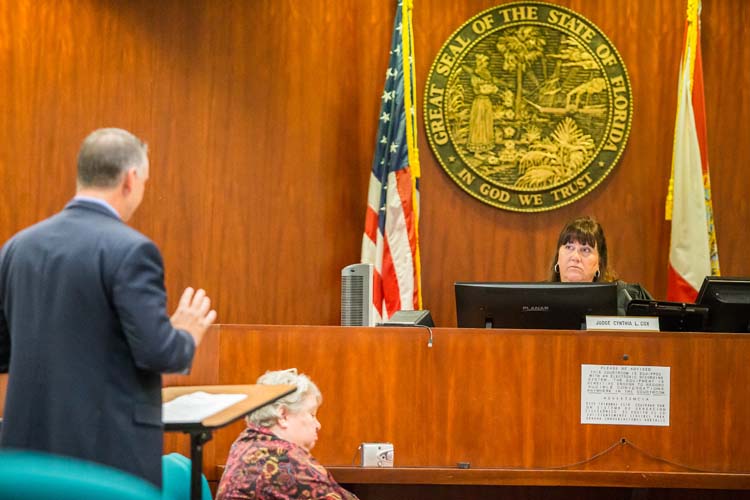
An effort by District Court Judge Cynthia Cox to hear more than 700 cases in three days turned into an angry confrontation with attorneys and their clients on the first day after Cox ran out of time, and had to reschedule about a dozen plea-bargain hearings for January.
Cox, who will step down from her post at the felony court at the end of December, was trying to complete as many cases as possible before her successor, Judge Dan Vaughn, arrives in January.
Her task was not as impossible as it may sound. A majority of the cases on the docket were status hearings, at which attorneys say they are ready for trial or that they need more time to prepare. Those hearings typically take a minute or less.
Nevertheless, with more than 230 cases queued up on Wednesday, Dec. 18, conflict and confusion eventually erupted.
The courtroom atmosphere was already tense before Cox arrived that morning because of the crush of people. Dozens of defendants were crammed into the court chambers, sitting uncomfortably close to each other or standing shoulder-to-shoulder along the walls.
As hearings got underway, with defendants waiting hours for their cases to be heard, the tension increased.
By the end of the 3 ½-hour session, several of the defendants and their attorneys, whose cases had not been heard, were openly irate, uttering obscenities aloud and engaging in verbal skirmishes with Cox as she dismissed court at 12:40 p.m.
“No, this is not right,” Vero Beach Attorney Andrew Metcalf shouted at Cox as he briefly started to approach the bench – without permission – before wisely retreating. “What are you going to do with all these people judge? They’ve been waiting here all morning.”
Cox, who had already listened to about 220 cases that morning, initially apologized to the still-waiting attorneys and defendants, but explained that she needed to let courtroom staff leave for lunch and had to prepare for Veterans Court, scheduled for 1:15 p.m.
“I apologize, we just had too many cases that needed to be heard this morning,” Cox said. “Your cases will be rescheduled for January.”
Several attorneys continued to argue loudly with Cox and some upset defendants initially refused to leave the courtroom. The three bailiffs in the room appeared stunned, glancing at each other several times as they tried to figure out how to restore order in the court.
It got worse.
Metcalf accused Cox of scheduling more cases than she could handle in one morning. He then approached the judge with a client and began talking about the case in an attempt to force Cox to listen.
His behavior angered the judge.
“No, we’re not going to do this,” Cox shouted at Metcalf, who continued to try and present his case for several more moments. “Court has been dismissed. You can come back Friday if you want to have this case heard.”
“I won’t be here Friday,” Metcalf responded in a sarcastic tone.
“Neither will I, so I guess that solves that issue,” Cox retorted.
Cox wasn’t finished, though. She reminded Metcalf and other attorneys that she had informed them in advance that she had 231 cases scheduled to be heard that morning and it was likely that there wouldn’t be enough time to hear the plea bargain cases, which often take 30 minutes or longer – but they still insisted on adding them to the schedule.
“I don’t understand what the problem is,” Cox told another attorney. “Your client is already free on bond. Postponing their sentence gives them a couple more weeks of freedom.”
The attorney replied, “I like to get things done and over with.”
“Really, because usually you’re up here requesting more time to get prepared,” retorted Cox. “Suddenly you’ve changed?”
Cox continued to scold the remaining attorneys.
“We might have gotten through this, but some people took up too much time,” Cox said pointedly, referring to attorneys who showed up late for court, or held up proceedings because they were absent from the courtroom when their cases were called.
Metcalf and other attorneys present declined to comment after leaving Cox’s courtroom.
Cox, who has adjudicated felony cases for the 19th Judicial Circuit for the past two years, is stepping down from her post at the end of December and will take over Family Court beginning in January.
She said her goal was to try and resolve as many of the 700 outstanding cases still under her watch as she possibly could so that Judge Vaughn, who currently oversees felony cases in St. Lucie County, wouldn’t be burdened with an overwhelming caseload when he takes over.
Several court officials said there was more behind Wednesday’s courtroom drama than just the crush of cases, though.
According to the officials, some of the irate attorneys with plea bargain cases wanted Cox to decide their clients’ fate, rather than Vaughn, who has a reputation for handing out harsh sentences and not allowing prosecutors to make plea deals with defendants – which usually result a shorter sentence than they might get at trial.



